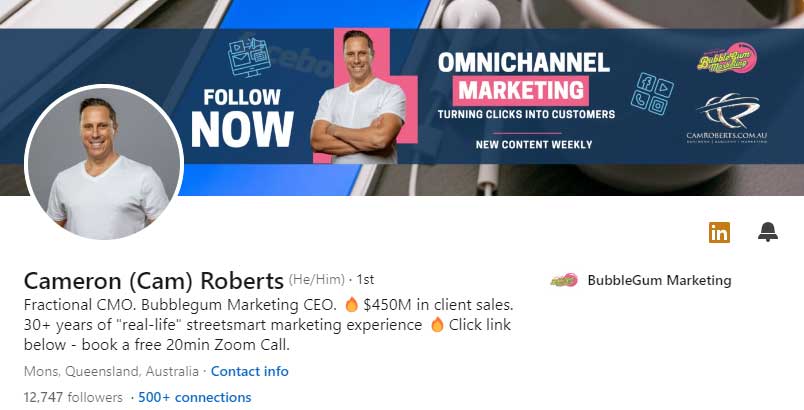The Importance of Content Creation
By Cameron Roberts – Founder & CEO of Bubblegum Marketing,
Posted On July 12, 2024
Content creation in the digital age has become a crucial aspect of business success. It’s a broad field, encompassing various strategies and techniques.
One of these strategies is content marketing. It’s a powerful tool that can significantly enhance your online presence.
But what exactly is content marketing? It’s the creation and sharing of online material. This material, whether it’s a blog post, video, or social media update, should provide value to its audience.
Content marketing is not about direct promotion. Instead, it’s about building relationships with your audience. It’s about providing them with useful, relevant information.
This approach can yield significant benefits. It can boost brand awareness, improve SEO, and generate leads.
But how can you leverage content marketing effectively? What strategies should you employ? And how can you measure your success?
In this article, we’ll explore these questions. We’ll delve into the importance of content marketing and provide actionable insights.
If you work in marketing, own a business, or are a lawyer wanting to improve your online presence, you will get useful tips here.
So, let’s dive in and discover the power of content marketing.
Understanding Content Marketing in the Realm of Online Marketing
Content marketing is a subset of online marketing. It’s a strategic approach focused on creating and distributing valuable content. The goal is to attract and engage a clearly defined audience.
The content you create should be tailored to your audience’s needs. It should provide solutions to their problems. It should answer their questions.
But content marketing is not just about providing value. It’s also about consistency. You need to regularly deliver high-quality content to your audience.
This consistent delivery of value can lead to profitable customer action. It can turn prospects into customers and customers into repeat buyers.
Here are some key aspects of content marketing:
- Value: Your content should provide real value to your audience. It should be informative, entertaining, or inspiring.
- Relevance: Your content should be relevant to your audience. It should address their interests, needs, and challenges.
- Consistency: You should regularly publish new content. This consistency can help you build a loyal audience.
- Distribution: You should distribute your content through various channels. These can include your website, social media platforms, email newsletters, and more.
- Engagement: Your content should encourage engagement. It should prompt your audience to like, share, comment, or take some other action.
By understanding these aspects, you can leverage content marketing effectively. You can use it to enhance your online marketing efforts and achieve your business goals.
The Evolution of Content Marketing and Its Current Significance
Content marketing has evolved significantly over the years, fo In the past, businesses relied heavily on traditional advertising methods. They used print ads, billboards, and TV commercials to promote their products or services.
However, with the advent of the internet, the marketing landscape changed dramatically.
Businesses started to realize the power of online content. They saw how it could attract, engage, and convert their target audience. They understood that content marketing was not just about selling. It was about building relationships with customers.
Today, content marketing is more important than ever. With the rise of digital consumption, businesses need to provide valuable content to stand out. They need to use content marketing to build brand awareness, generate leads, and drive conversions. In a world where consumers have endless choices, content marketing can be the key to business success.
Key Benefits of Content Creation for Businesses
Content marketing offers numerous benefits for businesses. It’s not just about creating content for the sake of it. It’s about creating content that resonates with your audience. Content that provides value and solves their problems.
When done right, content marketing can help businesses achieve their goals. It can help them build brand awareness, enhance their SEO efforts, and generate leads. It can also help them improve their conversion rates and build long-term relationships with their customers.
Here are some key benefits of content marketing for businesses:
- Builds brand awareness and credibility
- Enhances SEO and organic search rankings
- Generates leads and improves conversion rates
Building Brand Awareness and Credibility with Content Creation
Content marketing is a powerful tool for building brand awareness. By creating valuable content, businesses can attract their target audience. They can make their brand known to potential customers.
However, it’s not just about making your brand known. It’s also about building credibility. By providing valuable content, businesses can position themselves as experts in their field. They can build trust with their audience, which is crucial for long-term success.
In a world where consumers are bombarded with ads, content marketing can help businesses stand out. It can help them build a strong brand that resonates with their audience.
Enhancing SEO and Organic Search Rankings with Content Creation
Content marketing plays a crucial role in SEO and Social Media Marketing. By creating high-quality content, businesses can improve their organic search rankings. They can attract more traffic to their website, which can lead to more leads and sales.
But it’s not just about creating content. It’s also about optimizing it for search engines. This includes using relevant keywords, creating compelling meta descriptions, and using internal and external links.
By enhancing their SEO efforts, businesses can increase their online visibility. They can reach more people and grow their business.
Generating Leads and Improving Conversion Rates with Content Creation
Content marketing is an effective tool for lead generation. By creating valuable content, businesses can attract potential customers. They can use content to educate their audience about their products or services.
It’s not just about attracting leads. It’s also about converting them into customers. By providing valuable content, businesses can nurture their leads. They can guide them through the buyer’s journey and encourage them to make a purchase.
With a solid content marketing strategy, businesses can generate more leads and improve their conversion rates. They can turn their audience into loyal customers.
Strategies for Effective Content Creation
Creating effective content is not a walk in the park. It requires a deep understanding of your target audience and their needs. It also requires creativity and a knack for storytelling.
With the right strategies, you can create compelling and valuable content. Content that resonates with your audience and helps you achieve your business goals.
Here are some strategies for effective content creation:
- Understand your target audience
- Craft compelling and valuable content
Understanding Your Target Audience using Content Creation
Understanding your target audience is the first step in creating effective content. You need to know who they are, what they need, and what problems they are trying to solve.
Gather this information through market research. Then your next step for example to conduct surveys, interviews, and focus groups. You can also analyze your website analytics and social media data.
By understanding your target audience, you can create content that resonates with them. Content that provides value and helps them solve their problems.
Crafting Compelling and Valuable Content
Once you understand your target audience, you can start crafting compelling and valuable content. Content that grabs their attention and keeps them engaged.
Start by choosing a topic that is relevant to your audience. Then, create a compelling headline that piques their interest. Make sure your content is easy to read and understand. Use subheadings, bullet points, and images to break up the text.
But most importantly, make sure your content provides value. It should solve a problem, answer a question, or provide useful information. By providing value, you can build trust with your audience and encourage them to take action.
Types of Content Formats and Their Uses
Content comes in many forms. Each format has its own strengths and can be used to achieve different goals.
Some formats are better for educating your audience, while others are better for entertaining them. Some formats are more engaging, while others are more shareable.
Here are some common content formats and their uses:
- Blogs and articles
- Videos and infographics
Blogs and Articles for Content Creation
Blogs and articles are a staple of content marketing. They are great for educating your audience and providing in-depth information.
They are also great for SEO. By using relevant keywords, you can improve your search engine rankings and attract more organic traffic.
Videos and Infographics for Content Creation
Videos and infographics are more engaging than text-based content. They can help you explain complex topics in a simple and visual way.
They are also more shareable.
People tend to share videos and infographics on social media. This can help you reach more people.
Optimizing and Promoting Your Content
Creating great content is only half the battle. You also need to optimize and promote your content to ensure it reaches your target audience.
Optimization involves making your content search engine friendly. This can be done through keyword research, meta tags, and other SEO best practices.
Promotion, on the other hand, involves distributing your content through various channels. This can include social media, email marketing, and even paid advertising.
Here are some tips for optimizing and promoting your content:
- Use relevant keywords in your content and meta tags
- Share your content on social media and encourage your followers to share it too
- Send out an email newsletter with links to your latest content
- Consider using paid advertising to boost your content’s visibility
SEO Best Practices for Content Marketing
SEO is crucial for content marketing. It helps your content get found by search engines and reach more people.
Here are two key SEO practices for content marketing: Use relevant keywords in your content and meta tags. And, make sure your website is mobile-friendly, as more people are using mobile devices to access content.
Content Distribution Channels
Choosing the right distribution channels is key to promoting your content. Different channels reach different audiences, so choose the ones that best match your target audience.
Social media, email newsletters, and your own website are all effective channels for content distribution. Experiment with different channels to see which ones work best for your content.
Measuring the Success of Your Content Marketing Efforts
To understand the effectiveness of your content marketing, you need to measure its success. This involves tracking various metrics and analyzing the data within your sales funnel or website pages.
These metrics can include website traffic, social media engagement, and conversion rates. By monitoring these metrics, you can see how well your content is performing and where improvements can be made.
The main aim of content marketing is to make content that helps reach your business goals.
Key Performance Indicators (KPIs) and Analytics
Key Performance Indicators (KPIs) are specific metrics that you track to measure the success of your content marketing. These can vary depending on your business goals.
For example, if your goal is to increase website traffic, your KPIs might include page views and unique visitors. If your goal is to increase sales, your KPIs might include conversion rates and average order value.
The Role of Feedback and Continuous Improvement
Feedback plays a crucial role in content marketing. It helps you understand what your audience likes and dislikes about your content.
To succeed in content marketing, listen to your audience and keep improving your content over time.
Special Considerations for Different Business Types
Content marketing is not a one-size-fits-all strategy. Different businesses have unique needs and goals, which should be reflected in their content marketing strategies, including B2B Marketing.
For instance, an online marketing bureau might focus on showcasing their expertise and services. On the other hand, attorneys might aim to build trust and demonstrate their legal knowledge.
Content Marketing for Online Marketing Bureaus
For online marketing bureaus, content marketing is an opportunity to demonstrate their expertise. By creating high-quality content on marketing trends and strategies, they can attract potential clients.
Moreover, they can use content marketing to showcase their services and explain how they can help businesses grow.
Content Marketing for Attorneys
For attorneys, content marketing can be a powerful tool to build trust and credibility. By sharing informative content on legal topics, they can demonstrate their knowledge and expertise.
Moreover, they can use content marketing to answer common legal questions, making their services more accessible to potential clients.
Content Marketing for Ecommerce
Content marketing for ecommerce is essential for driving traffic, increasing conversions, and building brand loyalty. Ecommerce businesses can leverage content to showcase their products, educate their audience about their offerings, and provide valuable information to potential customers.
Online stores can enhance the shopping process by creating engaging product descriptions, helpful guides, and customer reviews.
Using blogs, videos, and social media can help online stores get more customers, keep the ones they have, and increase sales.
When you do content marketing for online stores, make sure to create good and useful content that speaks to what your customers want. This can be achieved via marketing automation.
Online stores can get more customers and make more money by improving website content. This is important for tracking performance using important metrics.
.
Conclusion: Integrating Content Marketing into Your Overall Online Strategy
In conclusion, content marketing is a crucial component of any successful online marketing strategy. It allows businesses to build trust, demonstrate expertise, and engage with their target audience in a meaningful way.
By using content marketing in your strategy, you can improve your online presence, boost SEO rankings, and get more leads and sales.
Remember, the key to successful content marketing is creating valuable, relevant, and consistent content that resonates with your audience. Ready to put your content creation on steroids? Schedule a quick zoom call to discuss the best strategies for your business or brand.
WANT TO BE OUR NEXT SUCCESS STORY?
Book a Free Consult
Schedule a 15-minute Free Consultation via Zoom meetings with our Director, Cam Roberts by clicking the button below now:
Recent Articles
- How We Scaled Google Ads Management for Home Services
- Why Your Email Click Rates Look Low in 2025
- How Our eCommerce Marketing Agency Drove 121% Growth
- What Is Google BARD? A Guide to Google’s New AI
- Facebook Ads Budgeting & Strategies for 2025
- Top Marketing Strategies from Fortune 500 Companies
- Weird & Wonderful: Things Google Probably Doesn’t Want You to Know
- Top 7 Mistakes Businesses Make Without a Facebook Ads Specialist
- Why Automated Sales Funnels Are a Game-Changer for Small Businesses
- How to Choose the Right Facebook Ads Agency in 2025
Request A Quote
Request A Quote for your next Website or Funnel Project below:













































